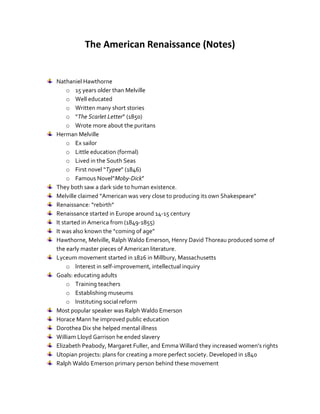
The american renaissance (notes)
- 1. The American Renaissance (Notes) Nathaniel Hawthorne o 15 years older than Melville o Well educated o Written many short stories o “The Scarlet Letter” (1850) o Wrote more about the puritans Herman Melville o Ex sailor o Little education (formal) o Lived in the South Seas o First novel “Typee” (1846) o Famous Novel”Moby-Dick” They both saw a dark side to human existence. Melville claimed “American was very close to producing its own Shakespeare” Renaissance: “rebirth” Renaissance started in Europe around 14-15 century It started in America from (1849-1855) It was also known the “coming of age” Hawthorne, Melville, Ralph Waldo Emerson, Henry David Thoreau produced some of the early master pieces of American literature. Lyceum movement started in 1826 in Millbury, Massachusetts o Interest in self-improvement, intellectual inquiry Goals: educating adults o Training teachers o Establishing museums o Instituting social reform Most popular speaker was Ralph Waldo Emerson Horace Mann he improved public education Dorothea Dix she helped mental illness William Lloyd Garrison he ended slavery Elizabeth Peabody, Margaret Fuller, and Emma Willard they increased women’s rights Utopian projects: plans for creating a more perfect society. Developed in 1840 Ralph Waldo Emerson primary person behind these movement
- 2. o His primary focus, wanted to improve public education, ending slavery, elevating power of women, and social conditions Utopian group became known as “The Transcendental Club” Transcendental: 18 century German philosopher Immanuel Kant o The word refers to the idea that in determining the ultimate reality of God, the universe, the self, and other important matters, one must transcend, or go beyond, everybody human experience in the physical world. Intuition is an important tool for discovering truth. That “oldest of thought” was Idealism “Idealism” came from the Greek philosopher Plato in the 14 centuries B.C. o Idealist said that the truth reality involved ideas rather than the world as perceived by the senses. Americans transcendentalists believed human should be perfect A Transcendentalist’s view of the world o Everything in the world, including human beings, is a reflection of the Divine Soul. o The physical facts of the natural world are a doorway to the spiritual or idea world. o People can use their intuition to behold God’s spirit revealed in nature of in their own souls. o Self-reliance and individualism must outweigh external authority and blind conformity to custom and tradition. o Spontaneous feelings and intuition are superior to deliberate intellectualism and rationality. 5 Basic Beliefs of Transcendentalism o Everything is a reflection of God People are basically good People will still sin, but they will repent and will most of the time choose do the right thing People are close to God Nature is great o Contemplating nature can allow you to transcend the real world and go to a higher, spiritual ever People can get close to God without church Nature is as close as you can get to God Society (the opposite of nature) keeps people from getting higher spiritual level o A persons instinct (intuition) can lead them to understand God’s spirit
- 3. Everyone can do this! Wealth, status, prior knowledge not needed Stressed that people were basically good – their gut instincts could lead them to God o Individualism and self-reliance are better than following others or depending on tradition People will make the right choices if given the chance Believed that government was not necessary Urged people to question tradition Materialism was not good; people should not be dependent on money or belongings o A persons true feelings and intuition are more valuable than book knowledge Average people were able to do this Money, wealth, status not necessary Trusted people to do and feel good things Emerson was the most influential and best-known member, largely because of his lectures and books Transcendentalism came from Europe and Asia o Puritan believes Puritan believed that God revealed himself to people through the Bible and through the physical world Religious revivalist was found by Jonathan Edward Romantic tradition was found by William Cullen Bryant Anne Bradstreet believed that God is the grandeur of nature. Jonathan Edward discovered God’s wisdom, purity, and love in the sun, moon, and starts Jonathan Edwards thoughts was known as Romanticism Transcendentalism based on philosophy of Idealism. Also of American thinkers raging from the puritans to the 19 century Romantic Transcendentalism viewed as a doorway to a mystical world holding important truths Intuition is our capacity to know things spontaneously and immediately through our emotions rather than through our reasoning abilities God is good, works through nature We are capable of evil because we are separated from a direct simply trust ourselves Melville, Hawthorne, and Poe were known as the anti-Transcendentalists o Because their views the world seems so profoundly opposed to the optimistic view of Emerson and his followers They were called the Dark Romantic
- 4. They both had common things: o Both value intuition over logic and reason o Like puritans o Believed in signs Dark Romantic o Didn’t believe every is good o They believed everyone is good and bad o Believed in guilt and sin